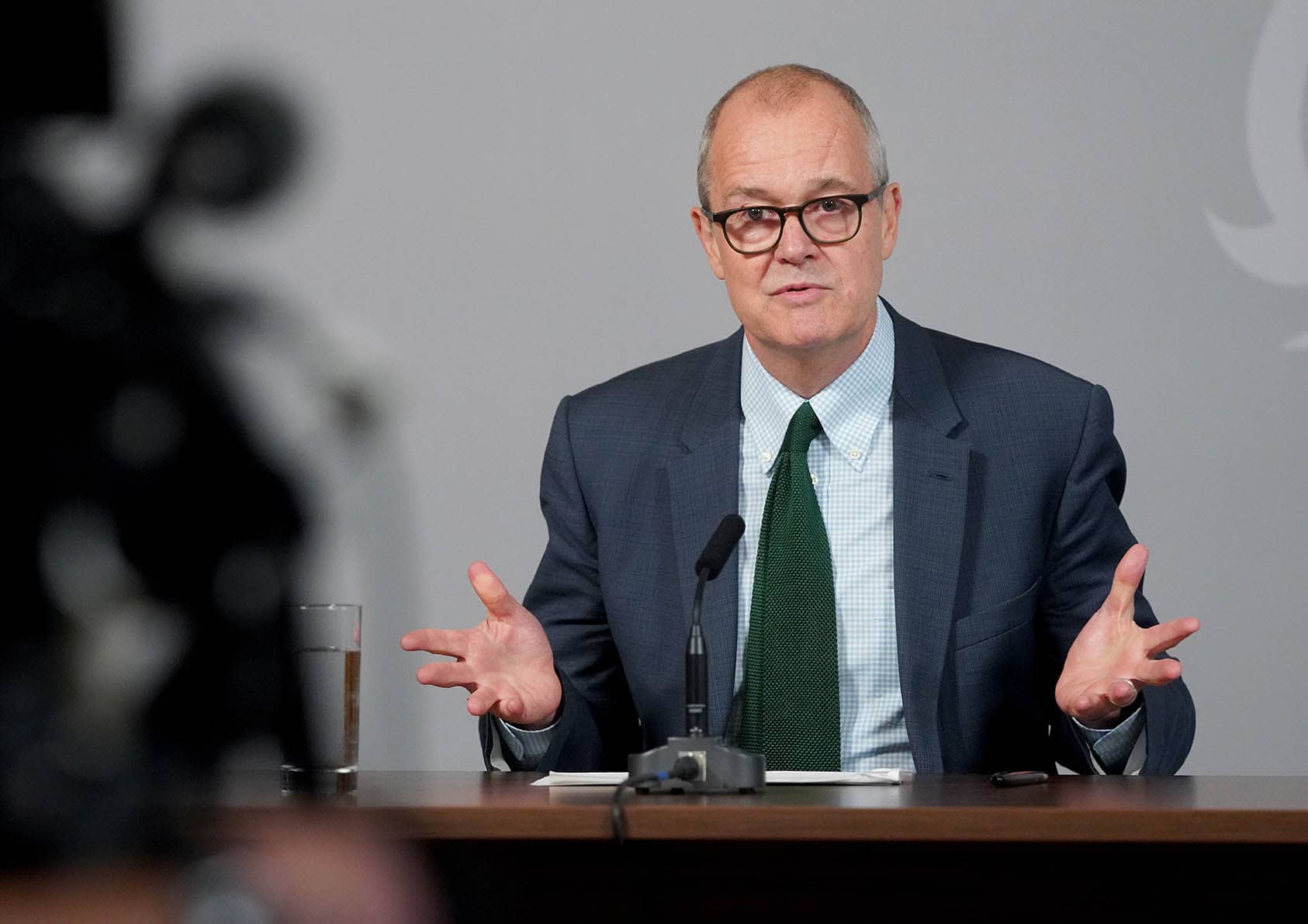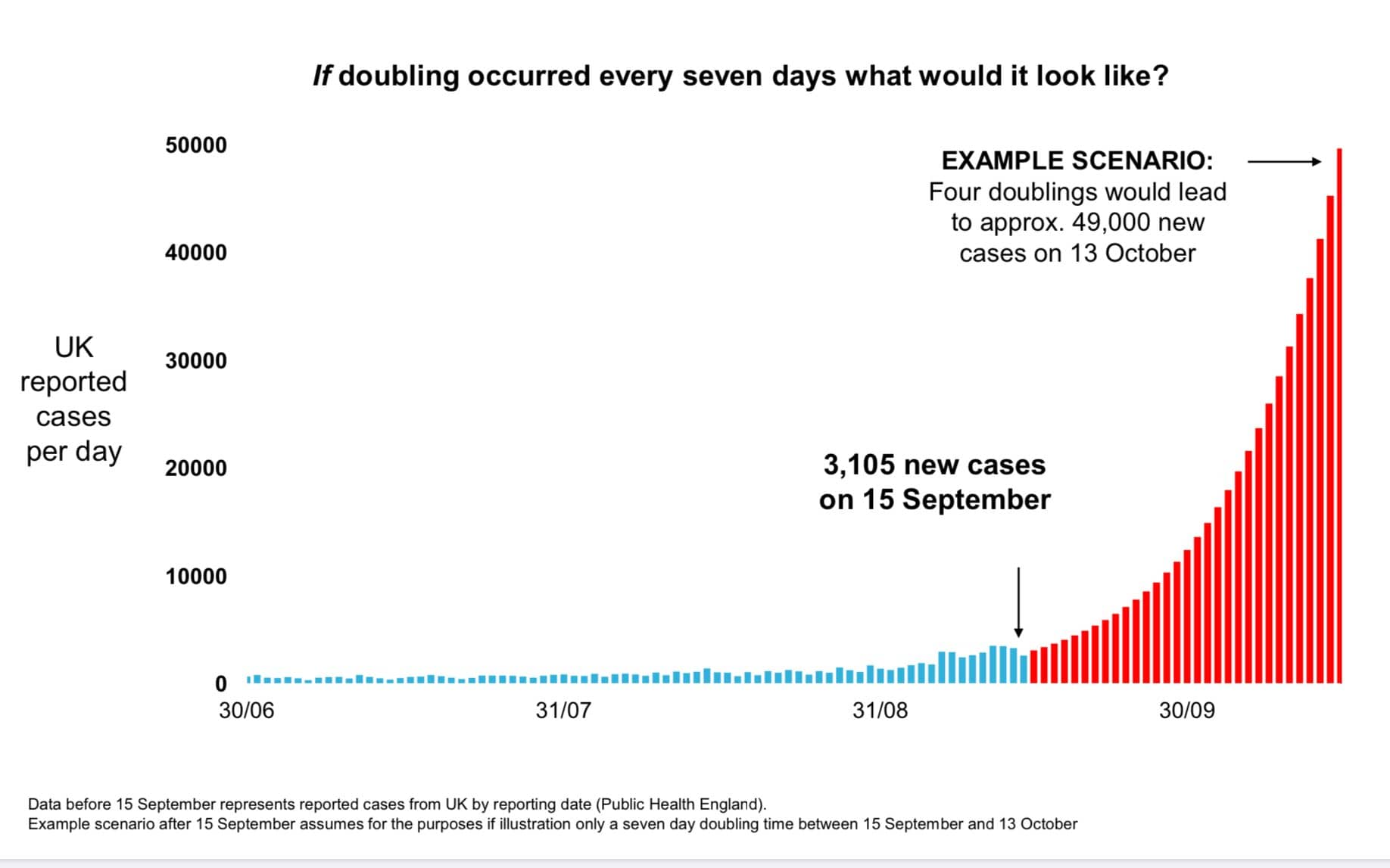Pound Sterling to Retain Soft Bias against Euro and Dollar as Fresh Covid-19 Restrictions Tipped to Slow Economic Recovery
- UK to hear of new restrictions
- GBP to struggle as economic recovery fades
- Stock market moves to also determine near-term outlook

Chief Medical Officer, Professor Chris Whitty and Chief Scientific Adviser, Sir Patrick Vallance give a Coronavirus Data Briefing in 10 Downing Street. Picture by Pippa Fowles / No 10 Downing Street.
- GBP/EUR spot: 1.0896 | GBP/USD spot: 1.2812
- GBP/EUR bank rates: 1.0690 | GBP/USD bank rates: 1.2553
- GBP/EUR specialist rates: 1.0798 | GBP/USD specialist rates: 1.2697
- Learn more about market beating exchange rates, here
The British Pound retains a soft bias against the Euro and U.S. Dollar ahead of the announcement of fresh restrictions in the UK aimed at stemming the spread of covid-19, while falling global stock markets and persistent Brexit anxieties are also said to be contributing to weakness.
Prime Minister Boris Johnson is expected to appear before the UK Parliament around midday where he will make a statement on the government's latest response to rising covid-19 cases.
He will then address the nation at 8PM.
Journalists at the UK's leading newspapers and broadcasters are widely reporting on Tuesday that the keystone announcement will see the Prime Minister announce pubs will be asked to close at 10PM on Thursday and only allow table service.
"With luck, a modest increase in containment measures, such as more diligent mask-wearing, enhanced social distancing and possibly reduced hours for restaurants and bars, should flatten the curve. Such measures would slow but not fully stall the ongoing economic recovery," says Kallum Pickering, Senior Economist at Berenberg Bank.
However, and potentially more significantly from an economic standpoint, some journalists are also reporting that Johnson will drop the call for workers to return to offices.
The developments are a mixed bag for the economy: on one hand the hospitality sector which is a significant employer and source of economic activity stays open and appears to have gotten off lightly; but on the other hand stopping workers returning to offices is a significant blow to major centres such as London which is the beating heart of the UK economy.
The Pound fell at the start of the week amidst fears a new nationwide lockdown would be announced after the UK's senior medical scientists held a press conference and stressed that unless the country changed course the UK could potentially see infections reach 50K a day in October. The warnings were seen as an effort to lay a path to further government interventions.
"The coming weeks are critical for the economic outlook. We need to assess whether fresh restrictions to bring the virus back under control could derail the upswing," says Pickering. "So far, the UK is trying to contain the breakout with modest national measures such as limiting the number of people in a social group, as well as stricter local measures in virus hotspots. If cases continue to accelerate, however, the government warns that more aggressive measures may be introduced."
Above: A scenario where cases double every week going forward, presented by the UK's chief scientific advisors. Critics say this worst case scenario is intended to scare the UK public, noting that the blue bars do not indicate a doubling of cases every week.
The Pound-to-Dollar exchange rate fell 0.8% on Monday and reached a low at 1.2776 before recovering to 1.2806 on Tuesday. The Pound-to-Euro exchange rate fell 0.20% on Monday and recorded a low at 1.0872 before recovering back to 1.0890 at the time of writing.
"The UK’s chief scientific officer warned that the number of coronavirus cases could increase exponentially to 50,000 per day in mid-October from around 4,000 presently. British Prime Minister Boris Johnson is expected to announce that pubs and restaurants across England would close at 10pm. Mr Johnson is no longer pushing hard for workers to return to office. The chancellor and other Tory members are resisting draconian measures that could hurt the UK economy which was hit hardest in the G7 by the pandemic. Given the circumstances, the prospect of a no-deal Brexit is not welcome," says Philip Wee, FX Strategist at DBS Markets.
Covid restrictions matter for Sterling which was one of the worst performing major currencies during the March-June period owing to the UK's prolonged and strict lockdown.
The currency recovered in the July-August period as the UK economy was released from lockdown and sectors started reopening, leading to a strong economic recovery.
However, renewed fears of restrictions in the autumn period could snap the recovery and contribute to Sterling underperformance over coming weeks.
"Government imposed lockdowns are not the only risk to economic growth. Falling confidence, reflecting fear of catching the virus and uncertainty about economic conditions, can also slow the economic recovery," says Kim Mundy, a strategist with CBA.
However it is not just the government's covid-19 respones that will be of concern to Sterling, the fate of global stock markets also matters. GBP/EUR and GBP/USD both tend to decline when global stock markets are selling-off, as was the case on Monday.
"A combination of second wave concerns, the passing of Supreme Court Judge Ginsburg, and related US election concerns pressured risk sentiment throughout the NY session seeing S&P trade -3% at one point before rallying hard on tech outperformance into the close,
to close –1.16%," says Kurran Tailor, a market analyst with Citi.
The Pound has shown a correlation to the movement in stock markets in 2020, proving to be particularly prone to bouts of equity market weakness. "Monday marked the worst sell-off for European equities since June as fears of new lockdowns swept markets. Commodities also dropped, while in FX, risk-sensitive emerging market currencies and commodity dollars took the brunt of the sell-off, while the like of the Pound and the Euro were also hammered," says Fawad Razaqzada, Market Analyst at Think Markets.
U.S. markets did recover towards the end of the session and Asian and European markets are looking better supported on Tuesday, which is arguably contributing to a steadier Pound Sterling. However, analysts are concerned that volatility and further losses are possible ahead of the November U.S. Presidential election.
"If this is the start of something bigger then we could have a long way to go before a bottom is in place – usually election years see US equities weaken from today into the end of October. With lockdowns returning and cases rising the overall outlook seems gloomy, and signs of growing political tension in the US in an already-fraught election campaign mean that investors will continue to find safety in havens," says Chris Beauchamp, Chief Market Analyst at IG.
A decline in stock markets from here will almost certainly contribute to further weakness in Pound exchange rates.
The British Pound fell sharply at the start of the new week as a deep stock market sell-off signalled a substantive negative shift in global investor mood.
Stock markets were lead lower by Europe's banking sector which were spooked by findings that some of the world's biggest lenders had been covering up industrial-scale money laundering for years, leading to fears U.S. authorities would levy punitive signs on an already struggling sector.
Buzzfeed News published documents detailing "how criminals use big-name banks to finance terror and death, and the government doesn't even stop it. Thousands of "suspicious activity reports" have been exposed that offer a "never before seen picture of corruption and complicity" involving bank payments and the U.S. administration's apparent willingness to let it go unchecked.
The massive sell-off in bank stocks suggests investors are worried the sector is set for further substantial fines. Given that the sector is already struggling with low profitability amidst a low interest rate environment, there are fears some names could go under. Indeed, some major banks cited in the report have yet to fully recover from the effects of the 2008 financial crisis.
The bank with the largest sums of money that are cited as being potentially fraudulent is Germany's Deutsche Bank.
How does this all impact the Pound? The UK is the world's key financing centre and boasts nearly half of the global daily foreign exchange transactions with the financial sector making up a greater proportion of the UK's economy than it does for the U.S. and Eurozone.
This appears to put the UK at risk of capital flight which appears to occur when stock markets are selling off, as was the case in March when markets melted as covid-19 spread.
This flight of capital in turn places downward pressure on Sterling.





